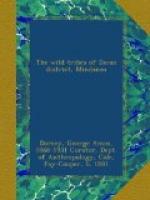the good year they have enjoyed, and to secure their
good will for the coming season. A great epidemic
or continued calamaties[sic] might also be signs that
the spirits were in need of another offering, and this
could take place at any time. Upon the death
of an adult it becomes the duty of the family to make
a sacrifice, but, unless the deceased is of very great
importance, they may wait until the yearly sacrifice[2]
when they can purchase a share in it. The one
other occasion for which this offering is obligatory
is the installation of a new datu in office.
For the yearly event the ruler should provide a decrepit
slave, and then invite all those who have had death
or trouble in the family and who wish a part in the
sacrifice to help bear the expense of the ceremony.
Guests gather from near and far and for two or three
days, feast, dance, and make merry in the house of
the datu. On the morning of the last day
they accompany their leader to a great tree in the
forest and there witness or take part in the sacrifice.
The victim is tied with his back to the tree, his
arms stretched high above his head. Meanwhile
a little table or altar is constructed near by, and
on it the principals place their offerings of betel
nut, clothes, or weapons, and on top of all is a dish
of white food for Eugpamolak Manobo. When all
is ready one of the magani begins a prayer,
begging the spirits to look and see that the people
are following the old custom, to give them success
in battle, and to protect their homes from sickness
and enemies. The prayer being completed, the
datu places his spear below and just in front
of the right armpit; then all those who have purchased
a share in the victim take hold of the weapon, and
at a signal given by the datu, thrust it through
the body. As soon as it is withdrawn, the magani
who has offered the greatest price for the privilege
attempts to cut the body in two with one blow of his
fighting knife. If he fails in the attempt, another
tries, and so on until someone succeeds. The two
portions are then released from the tree and cast
into a shallow grave near by. Before the body
is covered with earth any person who wishes may cut
off a portion of the flesh or hair and carry it to
the grave of some relative whom he may have reason
to believe is being troubled by evil spirits.
In such a case the evil spirit will be content to eat
of the slave, and cease disturbing the other body.
Returning to the house of the datu, the people
continue the dancing and merry-making throughout another
night.
[1] This is the constellation Orion which appears early in December.
[2] We have already seen that this offering sometimes occurs during the GinEm ceremony.
The following accounts are extracts from the official correspondence forwarded by the Governor of Davao to the Governor of the Moro Province:
“I have the honor to submit herewith a full report of an investigation made by myself and the Senior Inspector of Constabulary of Davao, regarding a human sacrifice made by the Bagobos at Talun near Digos on Dec. 9th, 1907.




